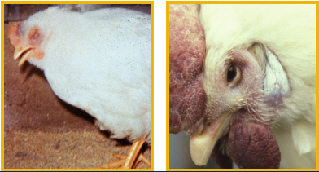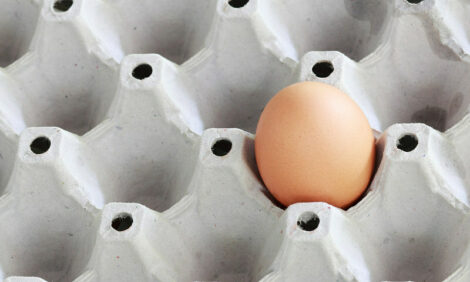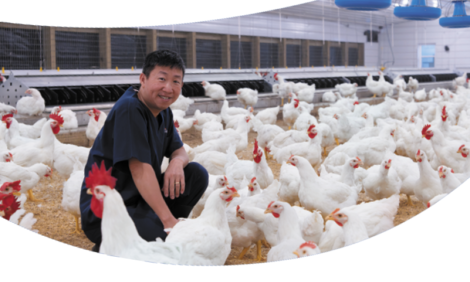



Backyard Poultry Biosecurity
Useful information for smallholders and hobby farmers on keeping their poultry healthy and what to do if you see signs of disease, particularly avian influenza or Newcastle disease.Backyard Biosecurity” is a simple, three-step process that will help keep your birds – and those of your neighbours – free of disease.
For more information, visit healthybirds.aphis.usda.gov and www.cdc.gov/zoonotic/gi.
1. Look
Know the warning signs of bird diseases such as avian influenza (AI), or “bird flu” and exotic Newcastle disease (END), also known as virulent Newcastle disease (vND).
Early detection can help prevent the spread of disease. While it may be hard to tell if your bird has one of these diseases, if you know the signs, you may be able to tell if something is wrong.
Early detection is important to prevent the spread of disease
2. Report
Don’t wait. If your birds are sick or dying, call:
- your local cooperative extension office/agent
- your veterinarian
- the State veterinarian or State animal/poultry diagnostic laboratory.
Or, call USDA’s Animal and Plant Health Inspection Service (APHIS) toll-free at 1-866-536-7593, and they will put you in touch with a local contact.
There is no charge for a disease investigation, if one is needed. Early reporting is important to protect the health of your birds.
3. Protect
When it comes to protecting your birds from disease, there are two things to keep in mind:
- Keep It Clean and
- Keep It Away.
Keep It CLEAN
If you practise these steps and make them part of your bird care routine, you will be doing a lot to help the health of your flock. Here are a few important things to remember:
- Wash your hands thoroughly before entering your bird area and before working with your birds. Use hand sanitiser if soap and water are not readily available.
- Clean cages and change food and water daily.
- Clean and disinfect equipment that comes in contact with your birds or their droppings, including cages and tools. Be sure to clean this equipment outside of your house.
- Make sure to clean off all dirt and manure before you disinfect equipment. If you do borrow tools or cages, clean and disinfect them before they reach your property.
- Scrub your shoes with disinfectant. This may seem like a lot of work but your boots and shoes can easily track disease to your birds. Or keep a separate pair of shoes or boots near your cages to wear only when working with your birds.
- Wear clean clothes that you use only when you feed and care for your birds. After feeding and caring for your birds, remove these clothes before entering your home.
Keep It AWAY
Restrict access to your property and your birds. Wild birds or new birds you have just purchased could carry diseases that could spread quickly to your flock.
Here are some things you can do to keep disease away from your birds:
- If visitors have birds of their own, do not let them near your birds.
- Avoid visiting farms or other households with poultry.
- If you’ve been near other birds or bird owners, such as at a feed store, pet store or bird club meeting, clean and disinfect your clothing, shoes, cages and equipment before going near your birds.
- Have your birds been to a fair or exhibition? If so, keep them separate from the rest of your flock for at least two weeks after the event. If you’ve bought new birds, they should be kept separate for at least 30 days.
- Buy birds from a reputable source so you know you are getting healthy birds.
- Do not share lawn and garden equipment, tools or poultry supplies with your neighbours or other bird owners but if you must, disinfect these items before bringing them home.
- Consider fencing off the area where you keep your birds and make a barrier area, if possible. Allow only people who take care of your birds to come into contact with them.
- Keep wild birds away from your flock. Wild birds should not have contact with your flock because they can carry germs and diseases. You should also keep your birds separate from insects and rodents.
- Properly dispose of dead birds. If one of your birds dies, don’t touch it with bare hands. Wear disposable gloves, double-bag the bird carcass with leak-proof plastic bags and place it in the normal household trash. Then, wash your hands and clean any clothing or indoor surfaces that came in contact with the dead bird.
Can You Spot the Signs of a Sick Bird?
Many bird diseases are difficult to diagnose. It is important to know the signs of bird diseases so you can tell when something might be wrong. If more than one bird in your flock is ill or dies, this could be the start of a devastating outbreak. Early detection of signs can help prevent the spread of the disease.

Right: Nasal discharge

Right: Swelling of the head, eyelids, comb, wattles and shanks
Avian Influenza (AI) / “Bird Flu”
AI viruses can infect chickens, turkeys, pheasants, quail, ducks, geese, and guinea fowl, as well as a wide variety of wild birds.
AI can strike poultry quickly without any signs of infection and spread rapidly. If you spot any of these signs, take action immediately by calling your extension office/agent, local veterinarian, State veterinarian, or State animal/poultry diagnostic laboratory. Or, call USDA’s toll-free number (1-866-536-7593) for a local contact.
Signs of bird flu:
- sudden death without any signs
- lack of energy and appetite
- decreased egg production
- soft-shelled or misshapen eggs
- swelling of the head, eyelids, comb, wattles and shanks
- gasping for air (difficulty breathing)
- purple discolouration of the wattles, comb and legs
- nasal discharge (runny nose)
- coughing, sneezing
- stumbling or falling down
- diarrhoea
Exotic Newcastle Disease (END)
END is a deadly viral disease affecting all species of birds. END spreads quickly and can infect and cause death even in vaccinated poultry.
If you spot any of these signs, take action immediately by calling your extension office/agent, local veterinarian, State veterinarian, or State animal/poultry diagnostic laboratory. Or call USDA’s toll-free number (1-866-536-7593) for a local contact.
Signs of END:
- sudden death and increased death loss in flock
- sneezing, gasping for air, nasal discharge, coughing
- greenish, watery diarrhoea
- decreased activity, tremors, drooping wings, twisting of head and neck, circling, complete stiffness
- swelling around the eyes and neck.
This information is also available in Spanish.
February 2015








